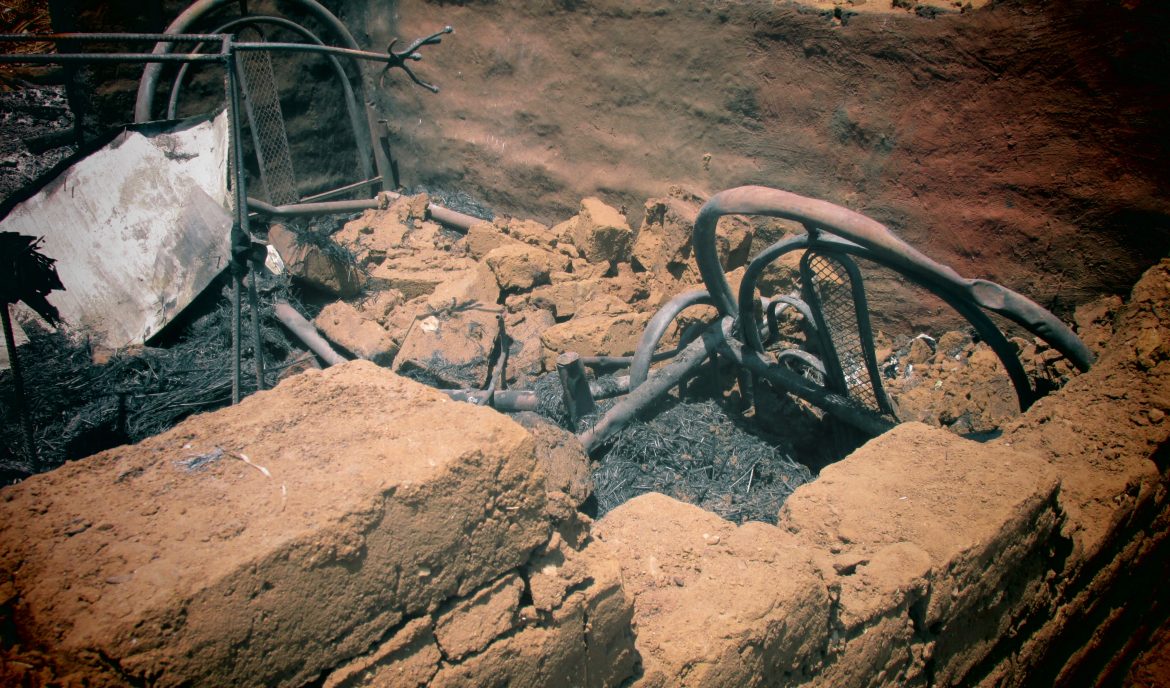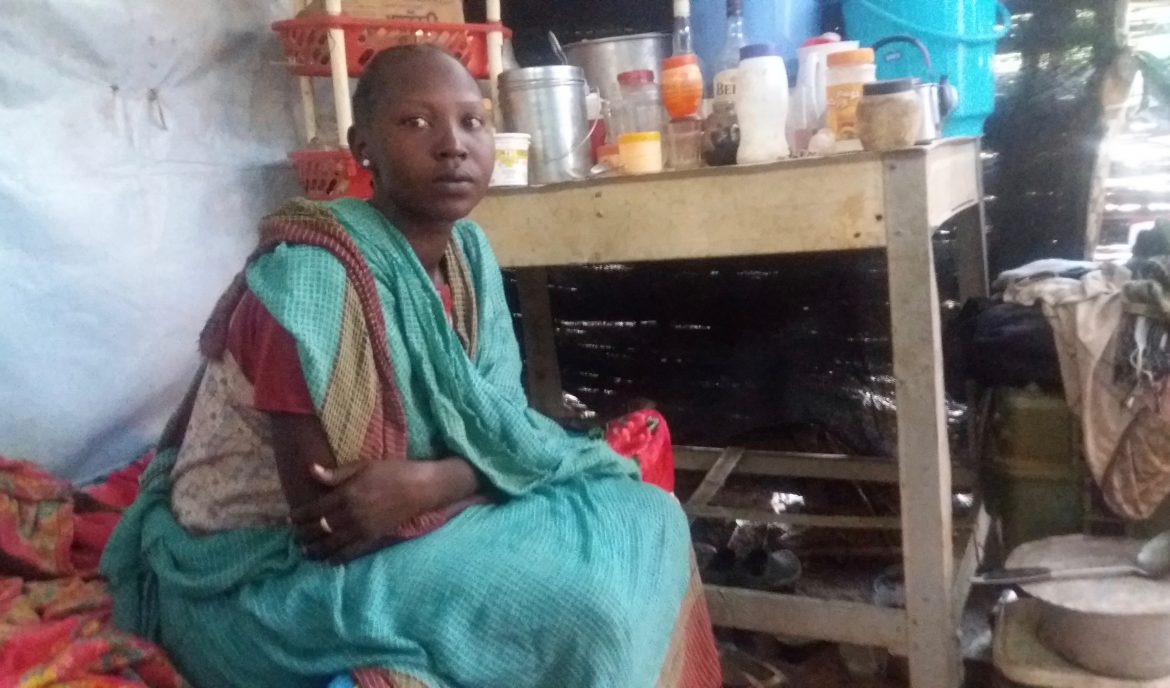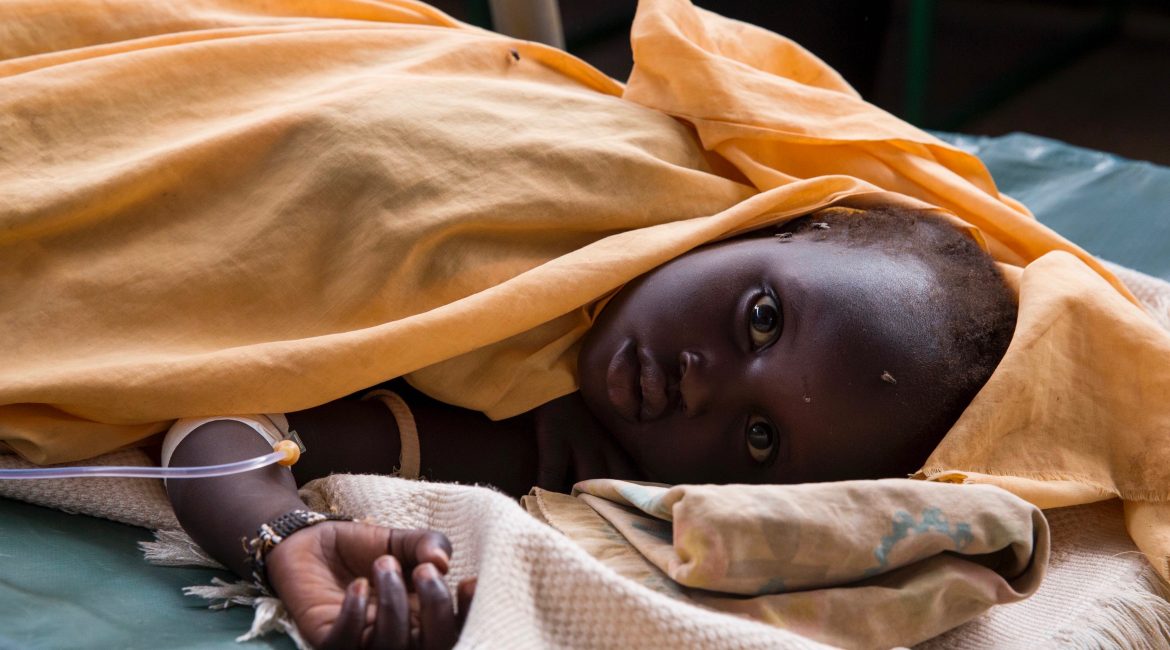This blog was originally published in the website Words in the Bucket
Mohamed Adam stared at the burnt rubble in front of him, oblivious to the heat of the noonday sun as he surveyed all his hard work, his home and food storage preparations, destroyed in a matter of minutes. A melted cassette can be seen peeping out of the ash piles, a Congolese pop album that his son had listened to incessantly. The Antonov, one of Sudan’s bumbling warplanes, bombed his house and food storage –forcing him and his family to survive on the goodwill of neighbours. Mohamed, a clerk for the rebel governor in the Nuba Mountains, was at his office that day in May 2016 when the Antonov flew overhead. When the deafening bomb dropped, he panicked and rushed to his family home. “Thank God my family was safe,” he said.
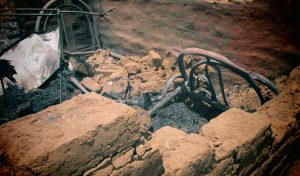
The remains of Mohamed Adam’s home (Nuba Reports)
Adam’s wife, Husna Mohamed and her two children managed to hide in a “foxhole” (a hole in the ground used to hide from the shrapnel spread by the government bombs) and survived. The lid covering the hole, however, caught on fire and slightly burnt the leg of their three-year-old child Munasid Mohamed. The young girl was rushed to the local hospital in Lewere for treatment, one of two facilities in the entire rebel-controlled area.
According to Johannes Plate, a medical field coordinator for the small but crucial hospital supported by the German Emergency Doctors organisation, the Sudanese government has repeatedly attempted to bomb the hospital. Like Adam’s house and all homes in the Nuba Mountains, the hospital has foxholes around the building in case a warplane attempts to bomb them.
“I hope you can see they are not just bombing military targets but civilians,” Adam said. “In Syria, the international community responded very quickly, why not to us? Are we not human beings like them?”
The Sudan government has bombed over 4,000 civilian targets since the conflict began in 2011.
The citizens of Nuba are currently enjoying a cessation of hostilities between the government and rebel army, the Sudan People’s Liberation Movement – North (SPLM-N) but occasionally Antonovs circle above ahead without bombing, local farmers told Nuba Reports.
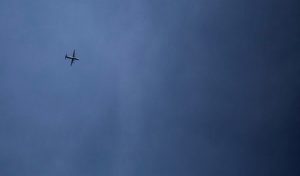
A government Antonov warplane circles above the Nuba Mountains (Nuba Reports)
The six-year Nuba current conflict is essentially an extension of the long civil war that eventually provided South Sudan its independence in July that same year. The Nuba people played a key role helping the former South Sudan rebel forces gain sovereignty. But nothing changed in the Nuba Mountains –unresolved promises of autonomy and suspected rigged local elections triggered renewed fighting between the Sudan government and Nuba rebels.
All attention –whether local or international—focused on South Sudan once Africa’s newest country gained independence and the conflict in the Two Areas: the Nuba Mountains in South Kordofan and Blue Nile state, are largely forgotten. When internal fighting broke out in South Sudan’s capital in December 2013, what little support South Sudan provided to the Nuba waned further. Sudan placed South Sudan’s President Salva Kiir under pressure to cease any support to the SPLM-N with the agreement that Khartoum would not support South Sudanese rebels targeting Kiir’s government. While there is physical evidence of Sudan’s support to these rebels in 2011 and 2012, there has not been any verifiable evidence of the same in recent years. This is partly due to U.S. pressure on Sudan’s President Omar al-Bashir to cease any meddling with South Sudanese affairs in return for the former to lift nearly 20 years of economic sanctions. Along with oil interests, America has invested heavily in South Sudan and does not want to see this go to waste.
With new political interests in Sudan, the west and the US, in particular, have little interest in the Nuba Mountains. The US may lift sanctions against Sudan in October largely in return for Khartoum’s non-interference in South Sudan, and, more importantly, for alleged anti-terrorism support. The EU is also keen to improve relations after funding Sudan in late 2015 to curb transitory migration through the country’s borders. “Both the UK and the US believe there are more important geopolitical interests at play in the region than the fate of Sudan’s minorities,” says Professor Samuel Totten. “Insofar as time is spent on Sudan in Washington or London, the US and UK have calculated they have more to gain by appeasing Khartoum than by challenging it.”
Besides a lack of regional and international political interest, there is very little media interest as well –partly because of access. Khartoum has banned reporting in the conflict areas. Sudanese authorities detained and questioned editors at the private daily Al-Tayyar twice this month for having the audacity to interview the Nuba rebel leader Abdulaziz Al-Hilu. For local and foreign media to gain entry into the rebel-controlled areas of Nuba Mountains or Blue Nile rebel is extremely taxing –the rainy season muddies road to the point where access is intractable half of the year. And even when a reporter manages to get to Nuba, selling the story poses another challenge.
Unlike the heart-pounding bombing campaigns reported in Syria’s six-years of conflict, the war in Nuba and Blue Nile is a war of attrition, whereby Sudan’s forces conduct intermittent attacks to slowly starve the populace into submission. Sudan forces continue to occupy two key agricultural areas and have seized farmland in over 20 locations in the Nuba Mountains. Pro-government militias raided and looted villages on at least 16 occasions in April and May this year. “It’s done purposely,” said Ali Abdelrahman, director of the Nuba Mountains Relief, Rehabilitation and Development Organization (NRRDO), a community-based support group. “To set fire to people’s homes, to drive away livestock – purposely to get them hungry. Once you get into that situation, you [either] die or join government-controlled territories whereby youth are recruited against their own people.”
There is still no humanitarian access to the Nuba Mountains at a time when nearly 10 percent of the population faces severe malnutrition rates, according to the South Kordofan Blue Nile Coordination Unit, an organization that monitors food insecurity in the two areas.
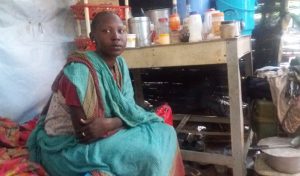
Rebel soldier Zachiah Issa Abdullah at home (Nuba Reports)
But limited media coverage and political interest are keeping a potentially dire food gap largely unknown, for a global and Sudanese audience alike. “Even if the world has forgotten us we will keep going,” said Zachiah Issa Abdullah, a female rebel soldier from Delami County in the Nuba Mountains. Zachiah is currently enjoying the ceasefire but remains prepared in case the conflict resumes. “When the ground fighting begins, I only think of those we have lost and, at the same time, I think of my children back home. Then I go forward, reminding myself who I am fighting for.”

